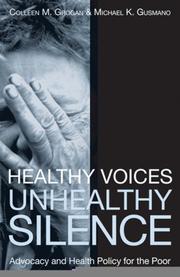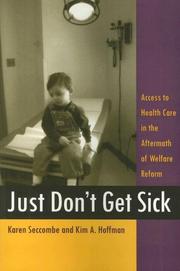| Listing 1 - 3 of 3 |
Sort by
|

ISBN: 1589012321 1435627520 9781435627529 9781589012325 9781589011632 1589011635 9781589011649 1589011643 Year: 2007 Publisher: Washington, D.C. Georgetown University Press
Abstract | Keywords | Export | Availability | Bookmark
 Loading...
Loading...Choose an application
- Reference Manager
- EndNote
- RefWorks (Direct export to RefWorks)
Do people of differing ethnicities, cultures, and races view medicine and bioethics differently? And, if they do, should they? Are doctors and researchers taking environmental perspectives into account when dealing with patients? If so, is it done effectively and properly? In African American Bioethics, Lawrence J. Prograis Jr. and Edmund D. Pellegrino bring together medical practitioners, researchers, and theorists to assess one fundamental question: Is there a distinctive African American bioethics? The book's contributors resoundingly answer yesùyet their responses vary. They discuss the co
Health Services Accessibility --- Cross-Cultural Comparison --- Bioethical Issues --- African Americans --- Health services accessibility --- African American philosophy --- Medical ethics --- Afro-American philosophy --- Philosophy, African American --- Philosophy, American --- Access to health care --- Accessibility of health services --- Availability of health services --- Medical care --- African-Americans --- African American --- African-American --- Afro-American --- Afro-Americans --- Afro American --- Afro Americans --- American, African --- Bioethical Issue --- Issue, Bioethical --- Issues, Bioethical --- Euthanasia --- Human Experimentation --- Patient Rights --- Animal Experimentation --- Transcultural Studies --- Comparison, Cross-Cultural --- Comparisons, Cross-Cultural --- Cross Cultural Comparison --- Cross-Cultural Comparisons --- Studies, Transcultural --- Study, Transcultural --- Transcultural Study --- Cultural Characteristics --- Culture --- Accessibility, Health Services --- Contraceptive Availability --- Health Services Geographic Accessibility --- Program Accessibility --- Access To Medicines --- Access to Contraception --- Access to Health Care --- Access to Health Services --- Access to Medications --- Access to Therapy --- Access to Treatment --- Accessibility of Health Services --- Availability of Health Services --- Contraception Access --- Contraceptive Access --- Medication Access --- Access To Medicine --- Access to Contraceptions --- Access to Medication --- Access to Therapies --- Access to Treatments --- Access, Contraception --- Access, Contraceptive --- Access, Medication --- Accessibility, Program --- Availability, Contraceptive --- Contraception, Access to --- Contraceptive Accesses --- Health Services Availability --- Medication Accesses --- Medication, Access to --- Therapy, Access to --- Treatment, Access to --- Medically Underserved Area --- ethics --- Access --- bio-ethiek (medische, biomedische ethiek, bio-ethische aspecten) --- cultuur (culturele aspecten) --- ras en gender --- sociaal-politieke aspecten --- Verenigde Staten --- bioéthique (éthique médicale, biomédicale, aspects bioéthiques) --- culture (aspects culturels) --- race et genre --- aspects socio-politiques --- Etats Unis --- Conferences - Meetings --- Medical ethics - Congresses --- African American philosophy - Congresses --- Health services accessibility - United States - Congresses --- African Americans - United States - Congresses --- Bioethical Issues - United States - Congresses --- Cross-Cultural Comparison - United States - congresses --- Health Services Accessibility - ethics - United States - Congresses

ISBN: 1589013395 1435631951 9781435631953 9781589013391 9781589011823 1589011821 Year: 2007 Publisher: Washington, D.C. Georgetown University Press
Abstract | Keywords | Export | Availability | Bookmark
 Loading...
Loading...Choose an application
- Reference Manager
- EndNote
- RefWorks (Direct export to RefWorks)
Public silence in policy making can be deafening. When advocates for a disadvantaged group decline to speak up, not only are their concerns not recorded or acted upon, but also the collective strength of the unspoken argument is lessenedùa situation that undermines the workings of deliberative democracy by reflecting only the concerns of more powerful interests.But why do so many advocates remain silent on key issues they care about and how does that silence contribute to narrowly defined policies? What can individuals and organizations do to amplify their privately expressed concerns for policy
Health Services Accessibility --- Health Policy --- Health Care Reform --- Advisory Committees --- Medicaid --- Equality --- Health services accessibility --- Poor --- Health care reform --- Patient advocacy --- Access to health care --- Accessibility of health services --- Availability of health services --- Medical care --- Disadvantaged, Economically --- Economically disadvantaged --- Impoverished people --- Low-income people --- Pauperism --- Poor, The --- Poor people --- Persons --- Social classes --- Poverty --- Health reform --- Health system reform --- Healthcare reform --- Medical care reform --- Reform of health care delivery --- Reform of medical care delivery --- Medical policy --- Health insurance --- Advocacy, Health care --- Advocacy, Patient --- Health care advocacy --- Nonlegal patient advocacy --- Social patient advocacy --- Advance directives (Medical care) --- Patients' associations --- Medicare --- Egalitarianism --- Inequality --- Social equality --- Social inequality --- Political science --- Sociology --- Democracy --- Liberty --- Dental Medicaid Programs --- Medicaid Program, Dental --- Medicaid Programs, Dental --- Dental Medicaid Program --- Medical Assistance, Title 19 --- Program, Dental Medicaid --- Programs, Dental Medicaid --- Governmental Commissions --- Review Committees --- Task Forces --- Advisory Committee --- Commission, Governmental --- Commissions, Governmental --- Committee, Advisory --- Committee, Review --- Committees, Advisory --- Committees, Review --- Governmental Commission --- Review Committee --- Task Force --- Ethics Committees --- Healthcare Reform --- Health Care Reforms --- Healthcare Reforms --- Reform, Health Care --- Reform, Healthcare --- Reforms, Health Care --- Reforms, Healthcare --- Healthcare Policy --- National Health Policy --- Health Policies --- Health Policy, National --- Healthcare Policies --- National Health Policies --- Policy, Health --- Policy, Healthcare --- Policy, National Health --- Policy Making --- Accessibility, Health Services --- Contraceptive Availability --- Health Services Geographic Accessibility --- Program Accessibility --- Access To Medicines --- Access to Contraception --- Access to Health Care --- Access to Health Services --- Access to Medications --- Access to Therapy --- Access to Treatment --- Accessibility of Health Services --- Availability of Health Services --- Contraception Access --- Contraceptive Access --- Medication Access --- Access To Medicine --- Access to Contraceptions --- Access to Medication --- Access to Therapies --- Access to Treatments --- Access, Contraception --- Access, Contraceptive --- Access, Medication --- Accessibility, Program --- Availability, Contraceptive --- Contraception, Access to --- Contraceptive Accesses --- Health Services Availability --- Medication Accesses --- Medication, Access to --- Therapy, Access to --- Treatment, Access to --- Medically Underserved Area --- economics --- Heath aspects --- Access --- Economic conditions --- Quality control --- Health aspects

ISBN: 0813540909 9786611151362 128115136X 081354145X 9780813541457 9780813540900 9780813540917 0813540917 9781281151360 9780813540900 6611151362 Year: 2007 Publisher: New Brunswick, N.J. Rutgers University Press
Abstract | Keywords | Export | Availability | Bookmark
 Loading...
Loading...Choose an application
- Reference Manager
- EndNote
- RefWorks (Direct export to RefWorks)
The ability to obtain health care is fundamental to the security, stability, and well-being of poor families. Government-sponsored programs provide temporary support, but as families leave welfare for work, they find themselves without access to coverage or care. The low-wage jobs that individuals in transition are typically able to secure provide few benefits yet often disqualify employees from receiving federal aid. Drawing upon statistical data and in-depth interviews with over five hundred families in Oregon, Karen Seccombe and Kim Hoffman assess the ways in which welfare reform affects the well-being of adults and children who leave the program for work. We hear of asthmatic children whose uninsured but working mothers cannot obtain the preventive medicines to keep them well, and stories of pregnant women receiving little or no prenatal care who end up in emergency rooms with life-threatening conditions. Representative of poor communities nationwide, the vivid stories recounted here illuminate the critical relationship between health insurance coverage and the ability to transition from welfare to work.
Health care reform. --- Health care reform --- Health insurance --- Health services accessibility --- Health Care Reform --- Interviews as Topic --- Insurance, Health --- Socioeconomic Factors --- Health Services Accessibility --- Oregon --- Social Welfare --- Delivery of Health Care --- Northwestern United States --- Health Planning --- Health Policy --- Data Collection --- Population Characteristics --- Sociology --- Insurance --- Patient Care Management --- Epidemiologic Methods --- Social Sciences --- Health Care Evaluation Mechanisms --- Financing, Organized --- Information Science --- Public Policy --- Health Care Quality, Access, and Evaluation --- Health Care Economics and Organizations --- United States --- Health Care --- Health Services Administration --- Quality of Health Care --- Anthropology, Education, Sociology and Social Phenomena --- Public Health --- North America --- Investigative Techniques --- Social Control Policies --- Economics --- Social Control, Formal --- Americas --- Analytical, Diagnostic and Therapeutic Techniques and Equipment --- Policy --- Environment and Public Health --- Geographic Locations --- Geographicals --- Access to health care --- Accessibility of health services --- Availability of health services --- Medical care --- Health plans, Prepaid --- Medical care, Prepaid --- Medical insurance --- Prepaid health plans --- Prepaid medical care --- Sickness insurance --- Health reform --- Health system reform --- Healthcare reform --- Medical care reform --- Reform of health care delivery --- Reform of medical care delivery --- Access --- Ambulance service --- Home care services --- Hospitals --- Medically uninsured persons --- Surgical clinics --- Medical policy --- Prospective payment --- Emergency services --- Outpatient services --- Rehabilitation services --- Accessibility, Health Services --- Contraceptive Availability --- Health Services Geographic Accessibility --- Program Accessibility --- Access to Health Care --- Accessibility of Health Services --- Availability of Health Services --- Accessibility, Program --- Availability, Contraceptive --- Health Services Availability --- Medically Underserved Area --- Healthcare Reform --- Health Care Reforms --- Healthcare Reforms --- Reform, Health Care --- Reform, Healthcare --- Reforms, Health Care --- Reforms, Healthcare --- Group Health Insurance --- Health Insurance --- Health Insurance, Voluntary --- Health Insurance, Group --- Insurance, Group Health --- Insurance, Voluntary Health --- Voluntary Health Insurance --- Group Interviews --- Interviewers --- Interviews, Telephone --- Oral History as Topic --- Group Interview --- Interview, Group --- Interview, Telephone --- Interviewer --- Interviews, Group --- Telephone Interview --- Telephone Interviews --- Community Services --- Services, Community --- Community Service --- Service, Community --- Welfare, Social --- Public Assistance --- Factors, Socioeconomic --- High-Income Population --- Inequalities --- Land Tenure --- Standard of Living --- Factor, Socioeconomic --- High Income Population --- High-Income Populations --- Inequality --- Living Standard --- Living Standards --- Population, High-Income --- Populations, High-Income --- Socioeconomic Factor --- Tenure, Land --- Access To Medicines --- Access to Contraception --- Access to Health Services --- Access to Medications --- Access to Therapy --- Access to Treatment --- Contraception Access --- Contraceptive Access --- Medication Access --- Access To Medicine --- Access to Contraceptions --- Access to Medication --- Access to Therapies --- Access to Treatments --- Access, Contraception --- Access, Contraceptive --- Access, Medication --- Contraception, Access to --- Contraceptive Accesses --- Medication Accesses --- Medication, Access to --- Therapy, Access to --- Treatment, Access to --- Social Inequalities --- Social Inequality --- Inequalities, Social --- Inequality, Social
| Listing 1 - 3 of 3 |
Sort by
|

 Search
Search Feedback
Feedback About
About Help
Help News
News